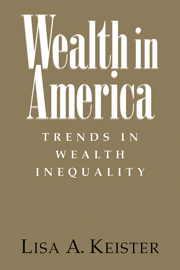Book contents
- Frontmatter
- Contents
- Preface
- PART I INTRODUCTION
- PART II WEALTH DISTRIBUTION
- 3 Who Owns What? The Changing Distribution of Wealth
- 4 The Rich and Their Wealth
- 5 The Rest of the Distribution: The Middle Class and Poor
- 6 Are Americans Getting Richer?
- PART III WEALTH ACCUMULATION
- Appendix: Research Design and Measurement Issues
- References
- Index
6 - Are Americans Getting Richer?
Published online by Cambridge University Press: 23 December 2009
- Frontmatter
- Contents
- Preface
- PART I INTRODUCTION
- PART II WEALTH DISTRIBUTION
- 3 Who Owns What? The Changing Distribution of Wealth
- 4 The Rich and Their Wealth
- 5 The Rest of the Distribution: The Middle Class and Poor
- 6 Are Americans Getting Richer?
- PART III WEALTH ACCUMULATION
- Appendix: Research Design and Measurement Issues
- References
- Index
Summary
Few matters having to do with economic life have been so much misunderstood as the problem of economic security. And in remarkable degree the problem persists.
(J. K. Galbraith)In this chapter I ask whether Americans have been getting richer over time. The general question I explore is whether wealth ownership has increased from one generation to the next. The notion of an American dream centers on the idea that children will be better off than their parents were at a similar age, and basic social science research on well-being has long used this notion as a starting point for asking various questions about intergenerational differences in prosperity. Recent literature with more practical policy concerns has begun to ask similar questions, focusing on how baby boomers, in particular, are doing financially relative to their parents. Baby boomers, the large post–World War II generation of people born between 1946 and 1964, have attracted attention at every point of their lives.
As Manchester pointed out in a study for the Congressional Budget Office, one of many government agencies that began to study the finances of boomers in the 1980s and 1990s, the strains that this generation put on resources at every stage of their lives not only attracted attention but also raised concerns that the system might not be able to bear the added pressure of the boomers (Manchester 1993). The baby boomers strained school resources in the 1950s and 1960s as their numbers filled classrooms to capacity. When the baby boomers reached adolescence, crime increased.
- Type
- Chapter
- Information
- Wealth in AmericaTrends in Wealth Inequality, pp. 134 - 164Publisher: Cambridge University PressPrint publication year: 2000



